Blogs
Diesel Generator Failure in Data Centers: How Fuel Filtration Can Prevent It?
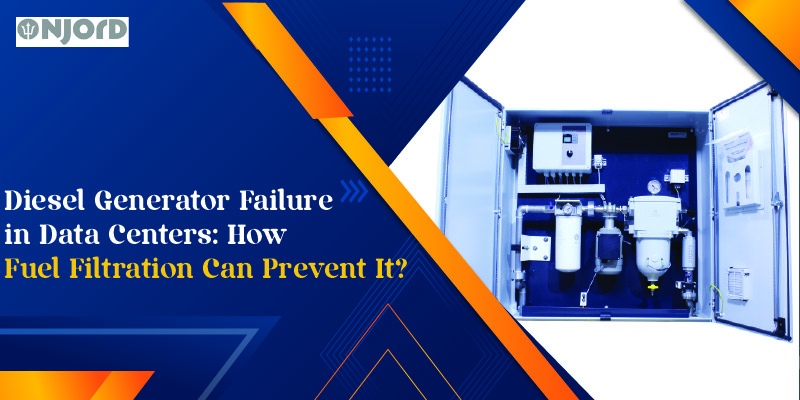
Most people think of data centers as highly controlled environments—full of blinking lights, air conditioning, and redundant systems designed to keep everything running no matter what. But there’s one common weak spot that gets overlooked far too often: fuel quality in the backup generators.
In 2025, research indicates that over 90% of medium and large enterprises report losses exceeding $300,000 per hour of downtime. In high-risk environments like data centers, that makes backup power absolutely non-negotiable. And yet, generators still fail frequently. One of the top reasons? Dirty, degraded, or contaminated diesel fuel.
Let’s talk about why it happens, what it costs, and how fuel polishing in a data center can keep your data center out of downtime.
Why Generators Fail?
Diesel generators are critical for data centers. When the grid goes down, they’re expected to kick in within seconds and carry the full load without hesitation. However, diesel fuel isn’t static, it changes over time. And that’s where the problems start.
Water contamination is one of the primary reasons that enters tanks through condensation or poor seals. Once it’s there, it creates the perfect environment for microbial growth—what some technicians call “diesel bug.” The byproduct is sludge. Sludge clogs fuel filters and lines. That alone can stop a generator from running.
Particles and sediment build up over time as well—rust from tank walls, dust from air ingress, and other contaminants that settle and spread. And then there’s oxidation, which happens when diesel ages. It thickens and breaks down, turning gummy and unstable.
All of these issues can lead to something you never want to deal with in a crisis: your generator failing to start, or worse, shutting down mid-run.
The High Cost of a “Small” Problem
This isn’t just about inconvenience. It’s about real business impact. A recent study found that 54% of major data center outages in 2025 resulted in losses exceeding $100,000, with nearly one in five exceeding the $1 million mark.
And many of those were caused not by storms or hardware faults—but by failed generators that hadn’t been properly maintained, or had been running on contaminated fuel. It’s not hard to see the pattern: you can have the best generator money can buy, but if the fuel feeding it is compromised, the whole system is at risk.
How Fuel Filtration Solves the Problem?
Fuel filtration—especially when paired with an efficient fuel polishing system—helps ensure the diesel in your tanks stays clean, dry, and ready to use.
Here’s what a good filtration system actually does:
- Removes water before microbial growth or corrosion happens
- Traps particulates before they reach engine components
- Circulates and filters stored fuel on a regular schedule
- Extends the usable life of diesel so you’re not wasting fuel or risking poor performance
With the right setup, you’re not just fixing problems—you’re preventing them. And in a world where the average cost of a serious outage is so high, prevention becomes more essential.
How to get started in your facility?
If you’re responsible for a data center, here are a few practical steps you can take:
- Test your stored diesel fuel regularly – Contamination often goes unnoticed until the generator fails. Don’t wait that long.
- Invest in a quality fuel filtration or polishing system – It pays for itself the first time your generator starts up flawlessly during a power cut.
- Include filtration into your maintenance routine – It’s not just about equipment; fuel needs the clean-up, too.
- Train your team – Ensure that the facilities staff and operators understand how fuel degradation works and how to identify warning signs.
The bottom line
Even if you’ve got the best backup generator, it can’t help if the fuel running it is unstable or full of sludge. Fuel filtration isn’t just a technical upgrade—it’s a critical part of protecting uptime and avoiding costly outages. If your data center relies on diesel backup power—and most do—it’s worth asking yourself a simple question: Is your fuel as ready as your equipment? If you’re not sure, it’s time to find out.
Contact Njord Filtration today to learn how the best fuel polishing system for data centers can keep your generators running smoothly when it matters most.Clean Fuel on the Go: The Advantages of a Portable Fuel Polishing System
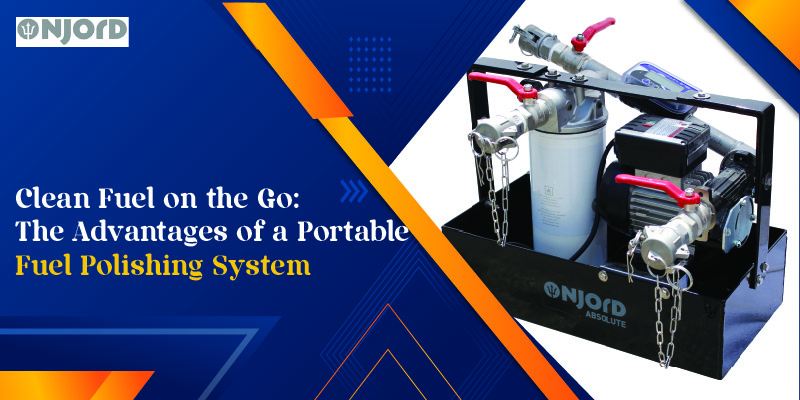
If you manage any kind of equipment that runs on stored diesel fuel, then you must also know that dirty fuel can be a big headache. Over time, any fuel tank can get contaminated with water and a thick sludge that can clog your engines. Cleaning out these tanks can be a very difficult and messy job. But there is a smart and simple solution: the portable fuel polishing system which brings the entire fuel cleaning process directly to your tank wherever it is.
Why is a Mobile Cleaning System a Good Idea?
The biggest reason to use a mobile system is that it is just so much easier. With a portable unit, you do not have to go through the trouble of pumping out all of your dirty fuel and moving it to another location to be cleaned. The machine comes right to your job site, boat, or building, which saves you a lot of time, money and hard work. It takes a big job and makes it so much simpler.
A mobile diesel cleaning unit is also very flexible. A single system can be used to clean a lot of different fuel tanks all at one location. For example, you can clean the tanks of all the heavy machines on a construction site. Or, you can easily move it to a totally different location like servicing a fleet of trucks at your main yard.
What Does a Portable System Do?
This system is designed to remove all the bad stuff from your fuel and leave it in a great condition. Here’s what all it does:
- It Removes Water: The system’s first and most important job is to pull the fuel from the bottom of your tank and run it through a water separator. This removes all of the water which is the main troublemaker that causes most fuel problems. Getting the water out of the tank stops new bacteria and fungi from growing.
- It Filters Out Dirt: After the water is gone, the fuel is then pushed through a series of very fine filters. These filters are made to catch and remove all the sludge, rust, and dirt that can clog up your engine’s filters and injectors. This is the main part of the diesel fuel restoration process.
- It Works on A Lot of Tanks: A portable system comes with its own pumps and long horses. This means it can be quickly and easily connected to a lot of different kinds of fuel tanks. It can be used on everything from the fuel tanks on your heavy equipment to the large backup generator tanks for a building.
- It Cleans the Whole Tank: This is much more than just a simple filtering job. The process of on-site fuel polishing circulates the entire amount of fuel in your tank at a high speed. This strong flow cleans both the fuel itself and also washed down the inside walls of the tank at the same time.
(Also Read: Fuel Maintenance Systems: Protecting Your Investment and Reducing Downtime)
How are These Systems Used in Different Industries?
These mobile systems are useful for many kinds of businesses:
- For Construction Sites: A single portable fuel polishing system can be moved around a large job site from one machine to the next. It can be used to clean the fuel tanks of all your heavy equipment like your excavators and bulldozers. This helps to stop unexpected engine problems that can cause downtime.
- For Marinas and Boats: Many boats sit for long periods of time which allows water to get into their fuel tanks. These systems are a great way to clean out a boat's fuel tank before the start of a new season. This makes sure that the boat's engine will be ready to go.
- For Backup Generators: A lot of important buildings like hospitals or data centers have large backup generators for emergencies. The fuel in these tanks can sit for years and go bad. A portable system is the best way to make sure that the fuel is clean and ready to go when it is needed the most.
Moving Forward
A portable fuel polishing system is a flexible and good way to clean your stored diesel fuel right where it is. It is also a great tool for any business that needs clean fuel to keep its important machinery running well. Visit our website to learn more about our mobile fuel polishing systems at Njord Filteration.
Feel free to contact us at Dit e-mailadres wordt beveiligd tegen spambots. JavaScript dient ingeschakeld te zijn om het te bekijken. if you need fuel tank cleaning services at your location and you don't know what to do.
Is Dirty Fuel Silently Damaging Your Fleet's Engines?
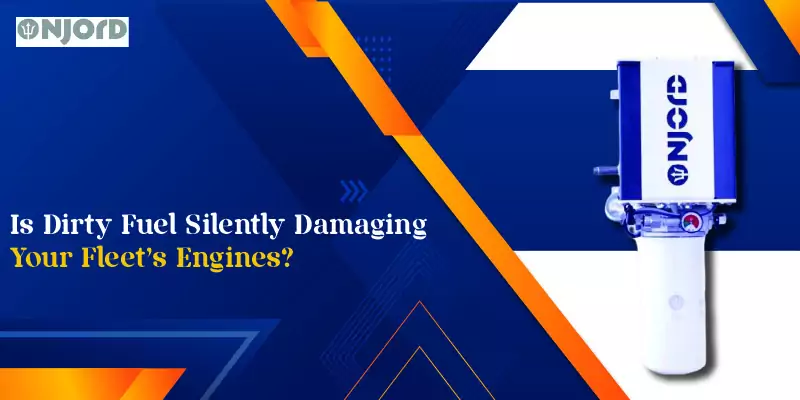
Running a fleet is a challenging job that involves juggling schedules, fuel costs, maintenance, and ensuring every truck operates smoothly without a hitch. The last thing you need is an engine acting up or a truck breaking down unexpectedly. But here's the thing—a lot of those issues might be coming from something most people never think about: dirty fuel.
Even if you're getting your fuel from a reliable source, it doesn't stay clean forever. Over time, things build up—water, gunk, even microbes—and start causing real problems. There's a simple fix: fuel polishing .
What's Dirty Fuel Exactly?
It sounds odd, but fuel can go "bad" just sitting in your tanks. Here's what tends to sneak in:
- Dirt and debris – These clog up your filters and make engines work harder than they need to.
- Water – Usually from condensation. It can cause rust in your tank and mess with fuel quality.
- Microbes – Bacteria and fungi actually grow in fuel, especially when water's present.
- Sludge – All the above builds up into thick, sticky gunk that kills performance.
If your trucks are acting sluggish, going through filters too fast, or you're noticing more breakdowns than usual, your fuel could be the problem.
So What's Fuel Polishing?
Fuel polishing is just a smarter way to clean up your fuel before it reaches the engine. Think of it like giving your fuel a deep clean: Here is what a fuel polisher does-
- Removes the dirt and sludge
- Remove the water
- And in many cases, even kill off bacteria or fungi.
- Then, the fuel gets circulated and cleaned multiple times.
By the end, what goes back into your system is clean, healthy fuel that your engines will thank you for.
Why Is This Important?
Because clean fuel means fewer headaches. Here's what you really get-
- Less downtime – No one likes dealing with breakdowns in the middle of a route.
- Lower repair costs – Clean fuel means fewer clogged injectors and filters.
- Better fuel mileage – Your engines run more efficiently with clean fuel.
- Longer engine life – You're protecting one of your fleet's biggest investments.
- Cleaner emissions – Helps keep you compliant and a little more eco-friendly.
The bottom line
At Njord Filtration, we make fuel polishing systems designed for fleet managers who just want their trucks running without all the drama. Our systems are fast, simple to use, and they work. If you're tired of engine issues or high maintenance costs, give your fuel some attention. A little polishing goes a long way. Let's keep your trucks moving and your costs down.
Check out our fuel polishing systems today—and see the difference clean fuel can make.Signs You Need to Replace or Upgrade Your Diesel Fuel Polishing System
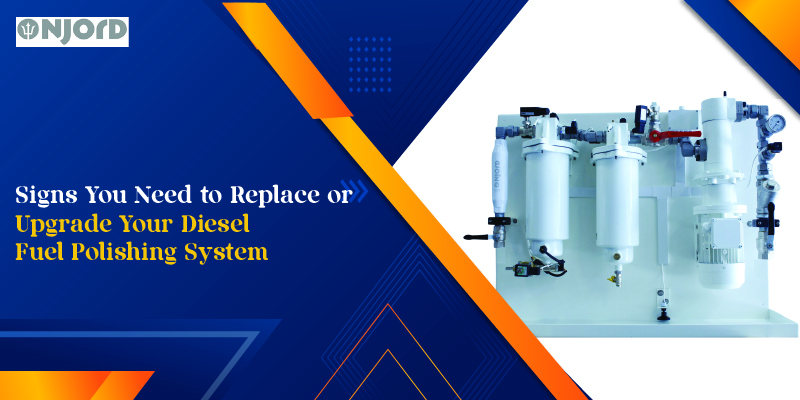
Now, when you rely on something too much, there comes a point where you know your journey with it has come to an end, and you need to move on to the next version of it. A diesel fuel polishing system is one of those. With a strong presence in major industries worldwide, if a polishing system fails, it can also fail to perform. While this is acceptable to some extent in residential sectors, machinery downtime in commercial industries can be costly for companies. In the healthcare industry, ignoring the polishing system can cost lives and, in some cases, result in even greater consequences.
Why is the Diesel Fuel Polishing System Important?
Now, as you may already know, diesel fuel polishing is the removal of water, sludge, and microbial growth from stored diesel. However, due to various circumstances, diesel fuel starts to degrade over time, and if left untreated, it forms layers of sludge, becoming a breeding ground for bacteria. Now, there is no doubt that when this contaminated fuel is fed into your diesel generator, it will cause engine damage, breakdowns, and costly repairs.
A diesel fuel polisher, on the other hand, is designed to circulate and clean stored diesel, ensuring it stays within safe operating parameters. In simple words, you can say that this system is a maintenance tool for your generator's fuel.
(Also read from our previous blogs: How Does Fuel Polishing Matter for Hospital Backup Power Reliability? )
When to Replace or Upgrade Your Diesel Fuel Polishing System?
If you notice the following signs in the diesel fuel polishing systems , you may want to replace or upgrade them:
- Recurring Microbial Growth
We mentioned earlier that diesel fuel attracts microorganisms when the water is contaminated. If you notice slimy black or green deposits forming in the tank, your fuel polishing system is not breaking the contamination cycle. - Frequent Filter Blockages
If your generator's filters are clogging more often than usual, your polishing system isn't removing enough contaminants. In most cases, this is with old or underperforming fuel polishers that can't handle heavy sludge or microbial growth. - Water Keeps Coming Back
A sound diesel fuel polishing system should separate and remove water. In many cases, water enters fuel tanks through condensation, leaks, or poor-quality diesel deliveries. So if you notice water keeps coming back despite polishing, you might want to check out Njord Filtration's advanced fuel polishing systems . - Visible Signs of Bad Fuel
Thankfully, you can see the visible signs of bad fuel. All you need to do is check for darkened, cloudy, or layered diesel; that's a strong warning sign. If you also see sludge at the bottom of the tank, you need to consider changing your polishing system; a sound system should prevent this from occurring. But if your fuel still looks contaminated, the system can't polish it to the required standard. - Rising Maintenance Costs
Are you constantly replacing filters, servicing your generator frequently, or repairing damage caused by contaminated fuel? Then you should talk to an expert and upgrade your machine, especially if it's a diesel generator fuel polishing system . - Unexpected Generator Failures
Your generator may not deliver its intended services. But if it fails a few times, it's time to replace the fuel polishing system because standby generators are supposed to provide backup power during emergencies. But if it fails to start when you need it most, contaminated fuel could be the culprit, caused by an outdated fuel polisher. - Excessive Smoke or Misfiring During Generator Operation
Finally, if your generator is emitting black smoke, struggling to start, or misfiring, it could be due to contaminated diesel slipping past your fuel polishing system. Because, as you already know, poor-quality fuel leads to incomplete combustion. So, don't waste time and replace or upgrade the fuel polishing system with the help of an expert.
Bottom Line
Every diesel fuel polishing system promises you its top-notch services. However, it is natural for them to eventually break down due to multiple different reasons, including overworking. While it is pretty common in these systems to stop working efficiently after long decades of usage, that does not mean you will ignore the signs and not upgrade or replace them with Njord Filtration fuel polishing systems.
Have queries? Speak to our experts. Click here to contact us.
The Importance of Micron Rating in Diesel Filtration
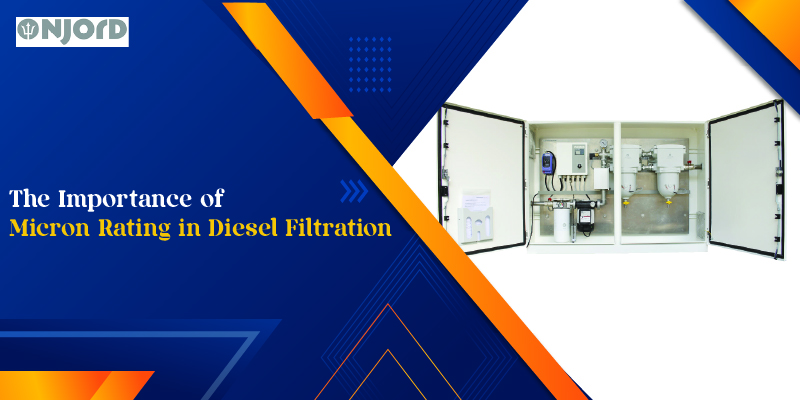
You already know that in diesel-powered systems, clean fuels play a significant role not only for the engine health, but also for uninterrupted operations. However, the level of purification of the diesel plays a substantial role in its performance. Well, that's where the micron rating of the diesel filtration system comes in. If you're unsure what a micron rating is and how it works in diesel fuel, this blog is for you.
Here, Njord Filtration will explain the different types of micron ratings, where they matter the most, and everything else you should know about them. So, keep reading to learn more.
But first…
Micron Rating in Diesel
Simply put, a micron, or micrometre, is a unit of measurement which is one-millionth of a meter, which is around 0.001 millimeters. For example, fine beach sand is of 90 microns while bacteria are of 0.5–5 microns. Similarly, diesel fuel flows through a filter designed to catch contaminants at 2, 10, or even 30 microns.
But why does that even matter?
Well, the answer is simple. Micron rating directly affects what kind of contaminants a filter can trap. In diesel fuel, the primary problems include water droplets, dirt or dust, metal shavings, rust particles, microbial sludge, and other fuel degradation byproducts. These particles can enter the fuel system, clog injectors, damage fuel pumps, and cause poor combustion, ultimately leading to complete engine failure.
(Also read from previous blogs: Preventing Diesel Engine Damage on Your Yacht with Advanced Filtration Systems )
However, it is also essential to know that two variants of microns play a significant role in diesel filtration, namely Absolute Micron and Nominal Micron.
Which industries should use Micron Ratings?
The following industries need a diesel filtration micron rating:
- Hospitals & Healthcare
In hospitals, the backup generators need clean fuel. For that, they use 5-micron or lower filters to prevent any failure. - Marine & Offshore Vessels
In the marine and offshore industries, the fuel quality degrades during long voyages. In such cases, filters with a size range of approximately 10 to 2 microns can protect the injector from damage during mid-sea operations. - Industrial Machinery
Next, in industrial machinery, heavy dust and moisture exposure can ruin the fuel quality. In that case, start with 30-micron pre-filters, followed by 5–10 micron final filters. - Fuel Storage Systems
Now, in fuel storage systems, sludge and microbial growth start to grow rapidly. For that, a mix of coarse and fine micron filters is best.
Nominal Micron Rating:
Nominal Micron ratings remove around 50–90% of particles of the stated size. For example, a 10-micron nominal filter will trap about 50–90% of all particles that are 10 microns in size. These are good for non-critical applications.
Absolute Micron Rating:
On the other hand, the Absolute Micron Rating removes 98.7% or more of the stated particle size, like a 5-micron absolute filter, which will capture nearly all particles that are 5 microns or larger. These are good for critical machines like marine engines, hospitals and airports.
How to Test If Your Micron Rating Is Working
Here's how to test diesel fuel cleanliness:
- Fuel Sampling
First, you need to take samples from your tank's top, middle and bottom layers and send them for lab testing. - Particle Count Analysis (ISO 4406)
The labs will then tell you how many particles per millilitre your fuel has at specific micron sizes. - Water Content Analysis
Since water in diesel is as problematic as solids, filters with good micron ratings should be paired with water separators.
Micron Ratings and Filter Maintenance
Choosing a finer micron filter, like 2 microns, will give you cleaner fuel. But it will also clog faster. To address this issue, you can utilize staged filtration, monitor pressure differentials across filters, and clean or replace them according to usage or maintenance intervals. But remember, balance is key because if it's too fine, it will clog. If it's too coarse, it won't filter well.
Bottom Line
Electricity is essential, whether in critical areas or non-critical areas. This is why it is vital to ensure that the micron sizes in the diesel filtration system are well balanced. As we mentioned earlier, the filtration result largely depends on the micron sizes. Therefore, for problem-free services, investing in a Njord diesel filtration system is essential.
Make the booking now by getting in touch with us. Contact here .